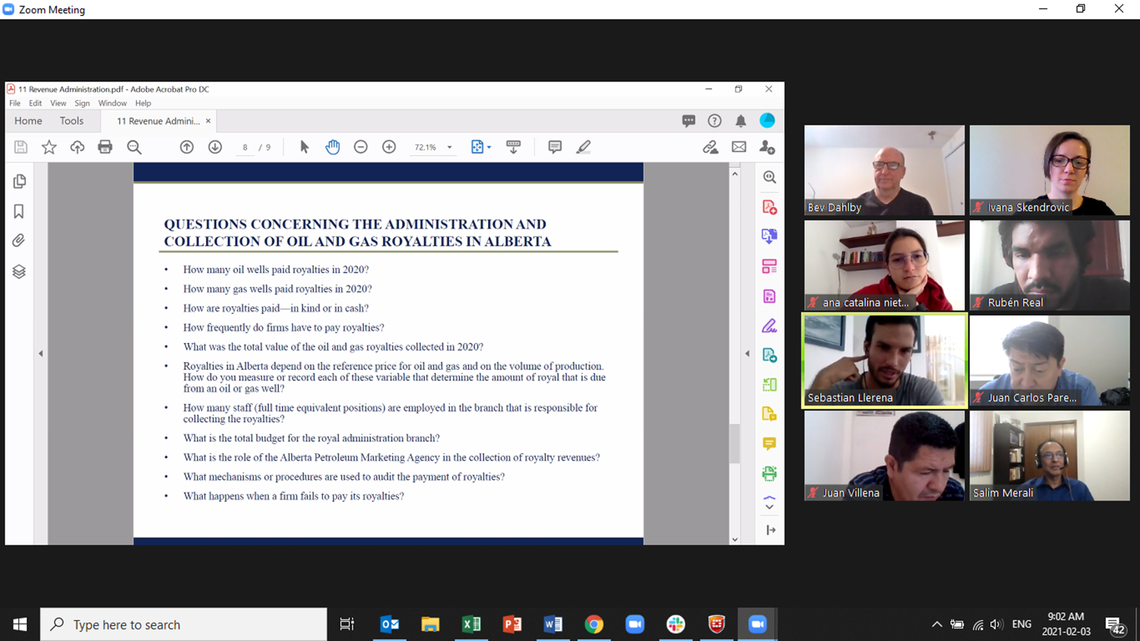Feb. 16, 2021
Extractive Resource Governance Program retools to survive in a COVID-19 world

It’s 7 o'clock on a snowy Calgary morning. Deborah Archibald, director of the Extractive Resource Governance Program (ERGP) at the University of Calgary School of Public Policy, hits the brew button on her coffeemaker and begins her day.
It's 3 p.m., 8,261 kilometres away in Croatia, as Ivana Skendrovic, ERGP’s partnerships officer, prepares her notes for the day's training session. Meanwhile, it's 10 a.m. in Colombia, 6,340 km from Calgary, where a delegation from Colombia’s National Environmental Licensing Agency, Mining and Energy Planning Unit has a quick virtual team meeting before their training begins.
And it's 8 a.m. in Manitoba, where UCalgary instructor and noted economist Dr. Bev Dahlby, PhD, is logging onto his computer to begin today’s training session, a Fiscal Governance Module. The session focuses on different fiscal regimes, principles of resource taxation, and resource revenue savings.
A silver lining: International online delivery
For more than a year, the COVID-19 pandemic has crippled many economies and the way citizens live. Through the uncertainty and turmoil, technology has not only helped keep us connected, but has allowed us to reinvent how we do business and see that business through a different lens. It’s been a saving grace and a silver lining.
The ERGP at The School of Public Policy provides expertise to work with and educate international officials, many in developing nations, who are trying to develop their own resource sectors. For years, the ERGP has flown all over the globe to help deliver this critical training. The program also welcomed numerous international delegations to Calgary, until the pandemic. ERGP was now at a standstill — and had to pivot quickly to survive.
“The COVID-19 pandemic gave ERGP the nudge that it needed to move into the world of online delivery for its executive certificate and workshop delivery,” says Archibald.
Retooled for the virtual world
“The process was one that many other organizations undertook. That is, we can no longer engage in person. How can we keep doing the work that we are doing in the virtual world? So, we looked at our executive certificate program, the customized workshops and retooled these to deliver virtually. We also took the opportunity to develop webinars in our area of expertise — this was something new to us. The first two were a matter of taking what we typically do in person to doing it online.”
ERGP adapted the course material to make it more interactive and interesting to audiences, but also adapted the schedule: instead of five days of in-person teaching, it would be delivered over a two-week period, to help counter Zoom fatigue.

Bev Dahlby discusses the administration and collection of oil and gas royalties in Alberta, part of the ERGP Executive Certificate, to a delegation from the Canada-Pacific Alliance Scholarship Program representing Chile, Colombia, Mexico and Peru.
Flexibility, relaxed environment, and pets
“Moving our programming online allowed us to connect with our audience on a more personal level with occasional visits from children or pets. Online teaching gave us more flexibility and created a more relaxed environment in our virtual classrooms,” says Ivana Skendrovic.
“It has been an amazing experience to enter the world of online course delivery — on the international stage. We have students in Bogota, Colombia, Chile, Mexico and Peru; three instructors and staff at different locations in Calgary; a staff member providing support from Croatia; and translators in Argentina and it has all gone seamlessly. The pandemic has opened up a world of opportunity for us,” says Archibald.
Students from multiple countries made the switch
ERGP recently concluded an Environmental Policy and Regulation workshop for a delegation from Colombia, including the National Environmental Licensing Agency, Mining and Energy Planning Unit, Ministry of Mines and Energy, Regional Environmental Corporation of the South Amazon, and the Ministry of Environment.
Through the Canada-Pacific Alliance Scholarship Program (CPASP), the ERGP will deliver three modules of its executive certificate. The next Executive Certificate on Public Engagement and Community Consultation is scheduled for March 8 to 19, 2021.
With the Government of Canada’s support provided through Global Affairs Canada, the CPASP supports alliance countries (Chile, Colombia, Mexico and Peru) in sustainably managing and regulating their extractive sectors. The ERGP is well positioned to offer the expertise to train international officials looking to develop their extractive sector.
Engagement strategies, policy issues, revenue best practices
The training will provide an overview of stakeholder and community engagement strategies with an emphasis of the importance on early and transparent engagement with local communities affected by extractive resource projects.
Many participants don’t have much experience with fiscal governance, so this program also provides them with an overview of policy issues and best practices in the collection, management and disbursement of resource revenue.
Ongoing interest in the governance services demonstrates the value and quality of the programming as well as the ability to respond to the emerging trends and move the programs online. With ERGP tools, the custom courses will help build capacity within governments attending the online training and open up a virtual world of opportunity.






